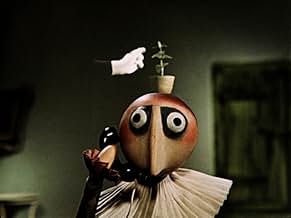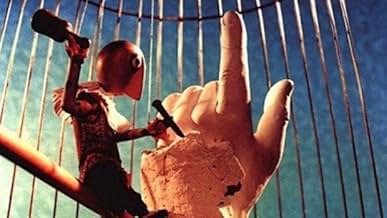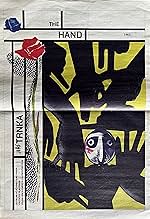IMDb RATING
7.9/10
2.2K
YOUR RATING
A delicate and secluded ceramist sees his orderly life turn upside down, when a gigantic hand in a white glove invades his space, demanding that a sculpture of itself is made. When will the ... Read allA delicate and secluded ceramist sees his orderly life turn upside down, when a gigantic hand in a white glove invades his space, demanding that a sculpture of itself is made. When will the hand's obstinate demands stop?A delicate and secluded ceramist sees his orderly life turn upside down, when a gigantic hand in a white glove invades his space, demanding that a sculpture of itself is made. When will the hand's obstinate demands stop?
- Director
- Writer
- Nominated for 1 BAFTA Award
- 1 nomination total
Featured reviews
10EdgarST
Jiøí Trnka made his last animated short an indictment of totalitarism, which caused him trouble in his native Czechoslovakia. The elements are few, the symbolisms simple, and his trademark ornaments almost absent here, allowing the viewer to concentrate on the fable. A man in his room dedicates to pottery and to take care of his only plant. But suddenly a huge hand enters the room and orders him to make a statue of itself. The man refuses and he's persecuted by the ominous gloved hand. In these days, where the impression of reality factor seems to be erased from most animations that try to replace the real world, it is refreshing to watch a film, which makes its technique part of the enjoyment.
a little potter. and his plant. a huge hand. and a statue. one of the most impressive animation. for the simplicity of great art. and for its status of warning. against totalitarian regime. about the resistance against it. about forms of freedom. and its price. so, more than a film. a document. and a testimony. about art as form of free speech in dark ages. this detail does "Ruka " special. a film about fragility. and about its delicate force. as inspired support. for reflection.
'The Hand (1965)' is a Czech new-wave stop-motion short by Jirí Trnka. It tells the tale of a harlequin sculptor who wants nothing more than to take care of his houseplant and create his art (it seems to be a bowl of some sort). In comes a giant hand demanding the sculptor make a statue in its image, and thus the conflict of the picture begins. The thing can easily be read as an allegory for the communism that the Czech Republic (formerly Czechoslovakia) found itself stifled by in the mid-to-late 20th century. The hand is an oppressive force that wants to make the sculptor conform to his wishes; it utilises a number of techniques, some more underhanded than others, to achieve this goal. Unsurprisingly, this leads to nothing other than tragedy. The sculptor will not allow himself to be controlled, so he fights back at every opportunity he gets. However, his fight ultimately feels a little futile because he's trapped no matter which way you look at it (the choice to have his house be surrounded by a void, almost as if it's the set of this film itself, compounds this). Technically speaking, this short is incredible. The animation is wonderfully fluid and instils a real sense of character to its simple protagonist despite his limitations (he doesn't blink, for example). The escalating interactions between the sculptor and the hand are also surprisingly believable. Plus, there are several visually inspired sequences, such as a 'thought bubble' phone conversation, and a generally engrossing atmosphere. It's a really engaging, entertaining and, ultimately, quietly affecting short film. 8/10.
The Czechs have long been famed for their animation, its deceptive cuteness making them palatable to most Westerners who will discern in them a critique of life under totalitarianism, although the staff at Disney doubtless found Uncle Walt just as intrusive a backseat driver.
In his final film Jiri Trnka plainly had plenty of baggage to get off his chest. The symbolism in employing a hand is vividly conveyed as it offers the frustrated hero a variety of blandishments - naturally including a television set - as it switches from fussily overbearing to seductive, complete with garter belts and nail varnish.
In his final film Jiri Trnka plainly had plenty of baggage to get off his chest. The symbolism in employing a hand is vividly conveyed as it offers the frustrated hero a variety of blandishments - naturally including a television set - as it switches from fussily overbearing to seductive, complete with garter belts and nail varnish.
Jiri Trnka had/has a very good reputation in his field for very good reason. He did some amazing work, such as 'Bajaja', 'A Midsummer Night's Dream', 'The Song of the Prairie' and 'Story of the Bass Cello'. And even lesser efforts such as 'The Merry Circus' and (for me) 'The Emperor's Nightingale' were still pretty impressive in many areas. 'The Hand', his last film, is a very atypical film for him and some may argue if familiar with his style that it doesn't feel like Trnka.
Which is what makes 'The Hand' so fascinating, often "it doesn't feel like" is associated as a criticism but actually it was an interest point. While other efforts of his are more accessible, especially all of the above, 'The Hand' gets my vote as his best (as well as his most personal, boldest and darkest) and what a film to go out on. It is very understandable as to why it caused a stir at the time, with the subject being so daring and ahead of the time and its shockingly pull no punches approach to it.
'The Hand' boasts truly beautiful and creepy visuals, have not seen such a vividly scary depiction of oppression for anything on film and certainly in any form of animation. The stop motion is simple but very atmospheric and never cheap, especially for the omnipresent hand. It is also very hauntingly scored and the live action is seamless.
Admittedly the messaging may not be subtle (inevitable though considering the subject), but it does bring out a lot of tension in a way that had never been seen before in anything else by Trnka and is presented very articulately. Not beating one around the head while effectively giving a sense of unease and dread.
In terms of atmosphere, 'The Hand' is a triumph. The depiction of oppression and totalitarialism (a subject that has always been topical and relevant) is quite terrifying and uncompromising, the subject was very daring back then and the execution of it is too. No wonder people felt uncomfortable watching it.
Heavy in symbolism 'The Hand' may be, but it is symbolism that has a lot of unsettling and thought-provoking meaning and is not simplistic, too confusing or ham-handed. Things that can be the case with symbolism. Still cannot believe that something without any dialogue was made in a way that is this powerful (a prime example of atmosphere speaking a lot louder than words). Never has a hand, a glove or any inanimate object been this unsettling or sinister.
The hannequin puppet may be one-dimensional in personality, but the emotions in the animation are more varied and nuanced than one would think.
Overall, brilliant and what a swansong for Trnka or for anybody. 10/10.
Which is what makes 'The Hand' so fascinating, often "it doesn't feel like" is associated as a criticism but actually it was an interest point. While other efforts of his are more accessible, especially all of the above, 'The Hand' gets my vote as his best (as well as his most personal, boldest and darkest) and what a film to go out on. It is very understandable as to why it caused a stir at the time, with the subject being so daring and ahead of the time and its shockingly pull no punches approach to it.
'The Hand' boasts truly beautiful and creepy visuals, have not seen such a vividly scary depiction of oppression for anything on film and certainly in any form of animation. The stop motion is simple but very atmospheric and never cheap, especially for the omnipresent hand. It is also very hauntingly scored and the live action is seamless.
Admittedly the messaging may not be subtle (inevitable though considering the subject), but it does bring out a lot of tension in a way that had never been seen before in anything else by Trnka and is presented very articulately. Not beating one around the head while effectively giving a sense of unease and dread.
In terms of atmosphere, 'The Hand' is a triumph. The depiction of oppression and totalitarialism (a subject that has always been topical and relevant) is quite terrifying and uncompromising, the subject was very daring back then and the execution of it is too. No wonder people felt uncomfortable watching it.
Heavy in symbolism 'The Hand' may be, but it is symbolism that has a lot of unsettling and thought-provoking meaning and is not simplistic, too confusing or ham-handed. Things that can be the case with symbolism. Still cannot believe that something without any dialogue was made in a way that is this powerful (a prime example of atmosphere speaking a lot louder than words). Never has a hand, a glove or any inanimate object been this unsettling or sinister.
The hannequin puppet may be one-dimensional in personality, but the emotions in the animation are more varied and nuanced than one would think.
Overall, brilliant and what a swansong for Trnka or for anybody. 10/10.
Did you know
- Trivia
- Award : Best Animated Film Award at the Oberhausen International Short Film Festival (West Germany, 1966).
- ConnectionsEdited into International Festival of Animation (1977)
Details
Contribute to this page
Suggest an edit or add missing content























